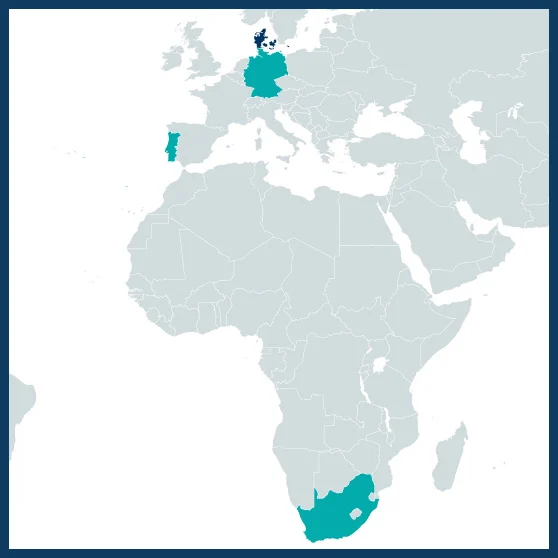31/03/2021 – 01/04/2024
€ 669,128
Romina Henriques
romhe@aqua.dtu.dk
Coordinator: Marine Living Resources – Technical University of Denmark – National Institute of Aquatic Resources – Silkeborg – Denmark
Agricultural Economics – University of Kiel – Kiel – Germany
Centre for Marine Sciences (CCMAR) – Faro – Portugal
Biosciences – University Institute of Psychological, Social and Life Sciences – Lisbon – Portugal
Botany and Zoology – Stellenbosch University – Stellenbosch – South Africa

Ongoing climate change is rapidly transforming marine ecosystems and communities throughout the world’s oceans. Increases in temperature are considered one of the main drivers of latitudinal distribution shifts in marine fishes, which are predicted to migrate towards cooler areas. These range shifts mean that commercially important species are likely to cross geo-political boundaries, increasing the likelihood of mismatches between current fishing practices (and policies) and future distributions. Forecasting models that predict range shifts are thus essential to anticipate and mitigate potential fisheries conflicts and the subsequent socio-economic impacts of a moving resource. Genomic data has the potential to increase the accuracy of forecasting models, by identifying locally adapted populations that might perform better/worse under certain climate scenarios.
GenClim brings together state-of-the-art genomics, forecasting modelling and socio-economic modelling to disentangle the multiple consequences of range shifts of commercially exploited marine fishes.
• Identify and assess the main genomic changes and the drivers of differentiation between core, leading and trailing edges of populations of range shifting species Merluccius merluccius, M. paradoxus and Engraulis encrasicolus.
• Improve the ability to foresee future range shifts by including genomic information, as well as the likelihood of populations persisting, expanding or collapsing under a changing and variable climate.
• Evaluate if the reliability of ecological forecasts depends on life-history features and evolutionary histories of species, or if they are primarily driven by region- specific climatic variability.
• Assess if the combination of genomic data and forecasting models can be used to anticipate socio-economic consequences of status-quo policies as well as of different management options, and thereby inform advice for relevant stakeholders, such as the International Council for Exploration of the Sea, the European Union, the Benguela Current Commission and national governments, to mitigate future conflicts arising from shifting resources.
GenClim conducts five major activities: sampling, acquiring and analysing genomic data, forecasting modelling, socio-economic modelling and disseminating activities. Sampling will be conducted between Portugal and Denmark in the north-eastern Atlantic, and Namibia and South Africa in the south-eastern Atlantic, targeting over 750 samples per species in each region. These samples will then be used to generate genomic datasets where GenClim will investigate population structure patterns and the presence of adaptive loci that might improve forecasting predictions regarding which populations are more likely to persist or collapse under different scenarios of climatic change. Finally, these forecasts will be used to run socio-economic modelling scenarios to understand which fisheries are more likely to thrive or disappear under different management regimes and climate scenarios.
Apart from academic dissemination activities, such as publishing papers and attending conferences, the outputs of GenClim will be of great importance for the development of future policies on fisheries under climate change. As such, engagement with stakeholders (Scientific Technical and Economic Committee for Fisheries (STECF) experts, Benguela Current Commission (BCC), national governments, fishery industry representatives and NGOs) will be conducted via yearly regional workshops and advisory reports. For example, GenClim will provide genomic metrics for International Council for the Exploration of the Sea (ICES) Benchmarks, as well as for National Stock Assessments; while forecasting outputs target the ecosystem overview approach of ICES. A final synthesis report will seek to integrate advice from STEFC Experts and the Coordinating institution to be published, as well as presented at the Annual Science Forum of the BCC.